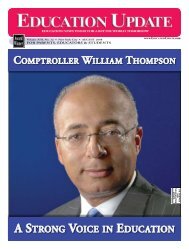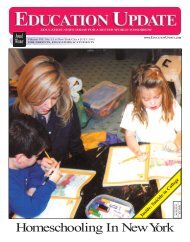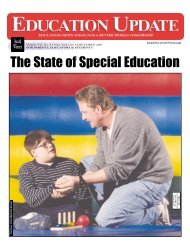Download PDF - Education Update
Download PDF - Education Update
Download PDF - Education Update
You also want an ePaper? Increase the reach of your titles
YUMPU automatically turns print PDFs into web optimized ePapers that Google loves.
DECEMBER 2006 ■ EDUCATION UPDATE ■ spotlight on schools“Say Yes to <strong>Education</strong>” Helps Harlem Youngsters Graduate HS & Pays for College TooBy Emily Sherwood, Ph.D.When Hartford money manager George Weissthrew out his signature football to a group of400 Harlem kindergartners and their parents twoyears ago, he was executing far more than anathletic maneuver. Weiss, a well-known philanthropistwho has given millions of dollars to innercity families since his “Say Yes to <strong>Education</strong>”program began in Philadelphia in 1987, wasoffering the gift of hope to a new cohort of “SayFOSS_5 x 10_bw ad 6/28/06 2:36 PM Page 1We wanted toknow the mostsuccessfulway to learnscience, sowe asked theclassroom experts!Don’t just open booksOPEN MINDSYes” students. Through a planned $50 millioninitiative in five Harlem elementary schools (P.S.161, 180, 57, 83, and 182), “Say Yes” will offerK-12 academic and social support for these lucky400 youngsters, with guaranteed payment of fulltuition to the college of their choice if they graduatefrom high school.“When Mr. Weiss made his announcement,I had to translate for some of the non-Englishspeaking parents,” said Carmen Vega-Rivera,FOSS ® (Full Option ScienceSystem), the most popularresearch-based scienceprogram in the nation, springsfrom research conducted atthe Lawrence Hall of Science.This research has guided the developmentof successful active-learning science curriculafor more than 25 years. Studies show studentsusing FOSS outperform students who don’t.When you contact us mention Lawrence Hall of Scienceand receive a free FOSSweb CD-ROM!University of California, Berkeley, California 94720Director of the NYC Chapter of “Say Yes.”“Then there was complete chaos in the room.Jaws dropped, tears were rolling. The emotionswere wild. One father picked up his child andcried, ‘We’re going to college!’”Two years later, the enthusiasm is just as palpable.The now-second grade children receivea rich infusion of academic support, with adedicated program manager and reading specialistin each of the five “Say Yes” schools whomake sure that each child has hisor her own IEP (Individualized<strong>Education</strong> Program) and that noone falls between the cracks.“Say Yes” provides three hoursof after-school homework helpand enrichment each weekday,social work assistance for parentsand families, physical andmental health services, and financialback-up where needed (evenparents can receive needed vocationalschool or college tuitiononce they’re in the “Say Yes”family.) A partnership with thelaw firm of Bingham McCutchenoffers families much-needed probono legal assistance in areasof immigration, child support,special education, housing, andmore. And a six week summerschool program, just rolled outthis year, offers youngsters theopportunity to keep up with theirliteracy and math skills duringthe long summer hiatus. “It’s notrocket science,” explains MaryAnne Schmitt-Carey, who justassumed presidency of the nonprofit“Say Yes to <strong>Education</strong>”in April. “We looked at the corechallenges for enabling inner cityhigh poverty youth to succeed towhat’s been defined as middleclass standards of achievement…It takes a much greater investmentin academic and non-academicsupport services, and a lotmore time.”The germ of the idea for “SayYes” came to Weiss when he wasa sophomore at the Universityof Pennsylvania and his fraternityhosted a Christmas partyfor 12 inner city adolescents.In his typical hands-on fashion,Weiss stayed in touch with eachof them; when he returned forPenn’s Homecoming weekendseven years later, he took themout to lunch and was heartened tolearn that every single youth hadgraduated from high school. Thereason: Weiss had cared so muchabout them that they could not lethim down. When Weiss made hisfortune in the investment arena,he returned to Philadelphiain 1987 and financed his firstcohort of “Say Yes” students atthe Belmont Elementary School,later expanding to Hartford (CT),Cambridge (MA) and now NewYork City.George Weiss presides overhis “Say Yes” family (there arenow 768 “Say Yes” children;the oldest of them is 31 yearsold) like a proud and often dotingfather. “We now have a ‘SayYes’ posse,” relates Weiss withobvious pride and joy at theaccomplishments of his oldestgraduates. “They rally aroundeach other. But when problemsget too serious, they call me,” headds, admitting to taking phonecalls from his “Say Yes” chargesat odd hours of the night. FromMary Anne Schmidt-CareyChildren in the programhis midtown Manhattan office, Weiss recountsa litany of almost unbelievable stories: Jarmaineis now an aerospace engineer for NASA, andLaureine (not her real name), a foster child whohad been abused, now has her own baby and ispurchasing her own home. “I’m getting emotional,”says Weiss, who clearly has invested morethan money in this incredible Cinderella storythat’s happening in four cities and shows no signof losing momentum.Statistically as well as anecdotally, “Say Yes”kids are beating the odds and achieving at higherrates than their inner city peers. In Cambridge,Hartford, and Philadelphia, high school graduationrates for “Say Yes” students hovered around75 percent, as compared to national averagesthat are closer to 50 percent. While there’s beenno systematic, longitudinal study of “Say Yes,”Schmitt-Carey is seeking foundation support todo just that, in addition to implementing a seriesof targeted objectives. “There was a lack ofaccountability and controls in the early years of‘Say Yes to <strong>Education</strong>.’ We’ve since learned lessonsaround the need for tough love, setting clearexpectations and defining boundaries,” notesSchmitt-Carey, who came to “Say Yes” from NewAmerican Schools (NAS) where she championedthe need for data-driven decision-making in publicschool reform. Following a six month, externalstudy of “Say Yes to <strong>Education</strong>,” she’s ready tomove ahead in instituting a set of more stringentpolicies “in the spirit of wanting to improve andenhance the program, not in a way that’s punitiveor looking to kick people out of the program.”With vibrant programs in Philadelphia, Hartford,and Cambridge and five classes of NYC eightyear olds just beginning their journey to collegeand beyond, “Say Yes to <strong>Education</strong>” has byanyone’s standards gone above and beyond thedefinition of philanthropy. Yet, George Weiss willbe the first to tell you that he hasn’t done enough:“There are so many kids out there who still needour help,” he says, shaking his head despondently.You can be sure that, with so much to beproud of, George Weiss is already hard at workidentifying new children on whom to bestow hismany gifts.#Next month’s <strong>Education</strong> <strong>Update</strong> will take anup-close look at how one school in Harlem ismaking dreams come true for “Say Yes” childrenand their families.
















